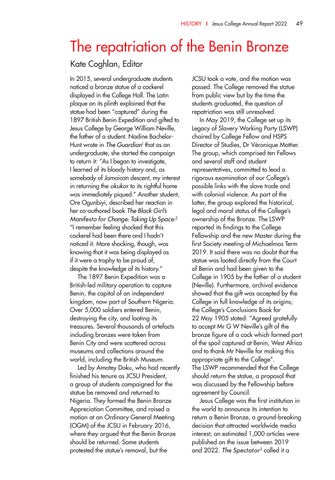HISTORY I Jesus College Annual Report 2022
49
The repatriation of the Benin Bronze Kate Coghlan, Editor In 2015, several undergraduate students noticed a bronze statue of a cockerel displayed in the College Hall. The Latin plaque on its plinth explained that the statue had been “captured” during the 1897 British Benin Expedition and gifted to Jesus College by George William Neville, the father of a student. Nadine BachelorHunt wrote in The Guardian1 that as an undergraduate, she started the campaign to return it: “As I began to investigate, I learned of its bloody history and, as somebody of Jamaican descent, my interest in returning the okukor to its rightful home was immediately piqued.” Another student, Ore Ogunbiyi, described her reaction in her co-authored book The Black Girl’s Manifesto for Change: Taking Up Space:2 “I remember feeling shocked that this cockerel had been there and I hadn’t noticed it. More shocking, though, was knowing that it was being displayed as if it were a trophy to be proud of, despite the knowledge of its history.” The 1897 Benin Expedition was a British-led military operation to capture Benin, the capital of an independent kingdom, now part of Southern Nigeria. Over 5,000 soldiers entered Benin, destroying the city, and looting its treasures. Several thousands of artefacts including bronzes were taken from Benin City and were scattered across museums and collections around the world, including the British Museum. Led by Amatey Doku, who had recently finished his tenure as JCSU President, a group of students campaigned for the statue be removed and returned to Nigeria. They formed the Benin Bronze Appreciation Committee, and raised a motion at an Ordinary General Meeting (OGM) of the JCSU in February 2016, where they argued that the Benin Bronze should be returned. Some students protested the statue’s removal, but the
JCSU took a vote, and the motion was passed. The College removed the statue from public view but by the time the students graduated, the question of repatriation was still unresolved. In May 2019, the College set up its Legacy of Slavery Working Party (LSWP) chaired by College Fellow and HSPS Director of Studies, Dr Véronique Mottier. The group, which comprised ten Fellows and several staff and student representatives, committed to lead a rigorous examination of our College’s possible links with the slave trade and with colonial violence. As part of the latter, the group explored the historical, legal and moral status of the College’s ownership of the Bronze. The LSWP reported its findings to the College Fellowship and the new Master during the first Society meeting of Michaelmas Term 2019. It said there was no doubt that the statue was looted directly from the Court of Benin and had been given to the College in 1905 by the father of a student (Neville). Furthermore, archival evidence showed that the gift was accepted by the College in full knowledge of its origins; the College’s Conclusions Book for 22 May 1905 stated: “Agreed gratefully to accept Mr G W Neville’s gift of the bronze figure of a cock which formed part of the spoil captured at Benin, West Africa and to thank Mr Neville for making this appropriate gift to the College”. The LSWP recommended that the College should return the statue, a proposal that was discussed by the Fellowship before agreement by Council. Jesus College was the first institution in the world to announce its intention to return a Benin Bronze, a ground-breaking decision that attracted worldwide media interest; an estimated 1,000 articles were published on the issue between 2019 and 2022. The Spectator3 called it a
